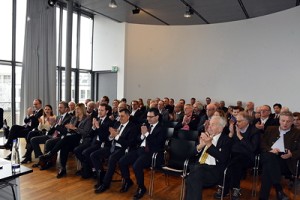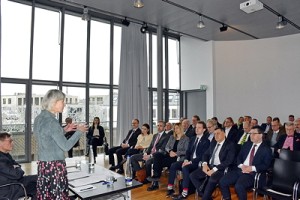Europe at a crossroads
This year, our annual reception took place at the Münchner Literaturhaus. President Eberhard Sinner welcomed the guests in the fully occupied "Foyer" on the 3rd floor of the building. First and foremost the representatives of the consular corps with Consul General Süalp Erdogan (Turkey), Consul Emöke Barabás (Hungary), Consul Stefan Inokof, (Bulgaria), Ms. Rhea Tsitsani and Mr. Georgios Lymperis (Greece), Mr. Maximilian Kallenbach (Switzerland). Present from the Bavarian State Parliament were: Vice President Markus Rinderspacher, former State Secretary Roland Weiger and Thorsten Freudenberger. Former Minister of State Erwin Huber was warmly welcomed. Among the guests were representatives of the Chamber of Industry and Commerce for Munich and Upper Bavaria, the Chamber of Crafts for Munich and Upper Bavaria, the Bavarian Values Alliance and other associations and organizations.


In his welcoming address, Eberhard Sinner referred to the current world situation with two terrible wars, one of which acutely threatens the security and freedom of Europe. He quoted from the book "The Inconvenient Past" by Nikolai Epplée and referred to the need to know history in order to understand the roots of today's problems and find solutions. At the moment, however, there is no prospect of negotiated solutions. This is precisely why it is necessary to strengthen the European Union in order to defend the values of a free Europe. With regard to Europe's tendency towards national isolationism, he quoted Franz Joseph Strauß, who recognized as early as 1968 that the nation state had outlived its usefulness. "That is why the peoples must carefully grow into a common Europe in full awareness of their good traditions and the skills they have developed in the bosom of the group. Our vision is a Europe of nations that has become a greater fatherland by overcoming its national divisions."
Angelika Niebler picked up the thread and made a very committed plea for strengthening the community. She reported on her work in the European Parliament. It is always difficult to reach compromises between opinions, some of which are gradually different, some of which are divergent. The same applies to coordination with the Commission. Strengthening the European Union is a complex issue that encompasses many aspects. One of the main problems currently affecting the EU is the issue of compliance with democratic principles and rule of law standards by all member states. Countries such as Hungary and Slovakia are often at the center of this discussion, as there are concerns about the restriction of press freedom, the independence of the judiciary and other basic democratic principles.
There are various approaches to strengthen the EU and address these issues:
Promote the rule of law:
The EU must ensure that all member states respect the democratic values and principles on which the Union is founded. This could be done by introducing stricter mechanisms to monitor and enforce the rule of law.
Dialogue and diplomacy:
A constructive dialog with the countries concerned is important in order to promote mutual understanding and find solutions that take into account the interests of all members.
Strengthen solidarity:
The EU should promote solidarity between member states in order to defend and protect common values. This could be done through joint measures to support civil society, the media and other democratic institutions.
Sanctions:
As a last resort, sanctions could be considered against Member States that repeatedly violate democratic principles. However, these should be used judiciously to avoid escalation and to encourage dialog.
Ultimately, strengthening the EU and tackling the problems in Hungary, Slovakia and other Member States requires coordinated and decisive action by all members to defend common values and objectives.
Over the years, the European Union has made progress in developing common policies in the areas of foreign policy, defense, economy and taxation. Here are some of the most important aspects in each of these areas:
Foreign policy:
The EU aims to have a common foreign policy that allows member states to speak with a common voice in the international arena.
The High Representative of the EU for Foreign Affairs and Security Policy coordinates the EU's foreign policy and represents it externally.
The EU uses instruments such as diplomatic negotiations, development aid, sanctions and multilateral cooperation to achieve its foreign policy objectives.
Defense:
In recent years, the EU has intensified its efforts to develop a common security and defense policy.
The establishment of the Common Security and Defense Policy (CSDP) aims to ensure the security of the EU and its citizens and to contribute to peacekeeping.
Measures include joint military missions, strengthening the defense capabilities of member states and promoting cooperation in the defense industry.
Economy:
The EU pursues a policy of economic integration aimed at creating a common internal market and promoting the free movement of goods, services, capital and people.
The European Economic and Monetary Union (EMU) includes the introduction of the euro as a common currency as well as coordinated economic policies and a common monetary policy through the European Central Bank.
Taxation:
Although tax policy is mainly the responsibility of the member states, there are efforts to strengthen tax harmonization and the fight against tax evasion at EU level.
The EU has introduced directives on combating tax avoidance, corporate tax transparency and the coordination of VAT rates.
Progress in these areas varies depending on the political will of the Member States and the specific challenges facing the EU. The creation of common policies often requires complex negotiations and compromises to balance the different interests and priorities of Member States.
The EU faces the need for comprehensive reforms before the - politically desired - accession of new countries. The principle of unanimity must be overcome.
In future, only Europe as a unified whole will be able to play a role on the world political stage. Even the most populous countries in the EU, Germany, France and Poland, do not have fewer inhabitants than regions in India and China. As the world's strongest economic area, the EU cannot use this strength if small-scale interests prevail.



All photos ©Robert Auerbacher
